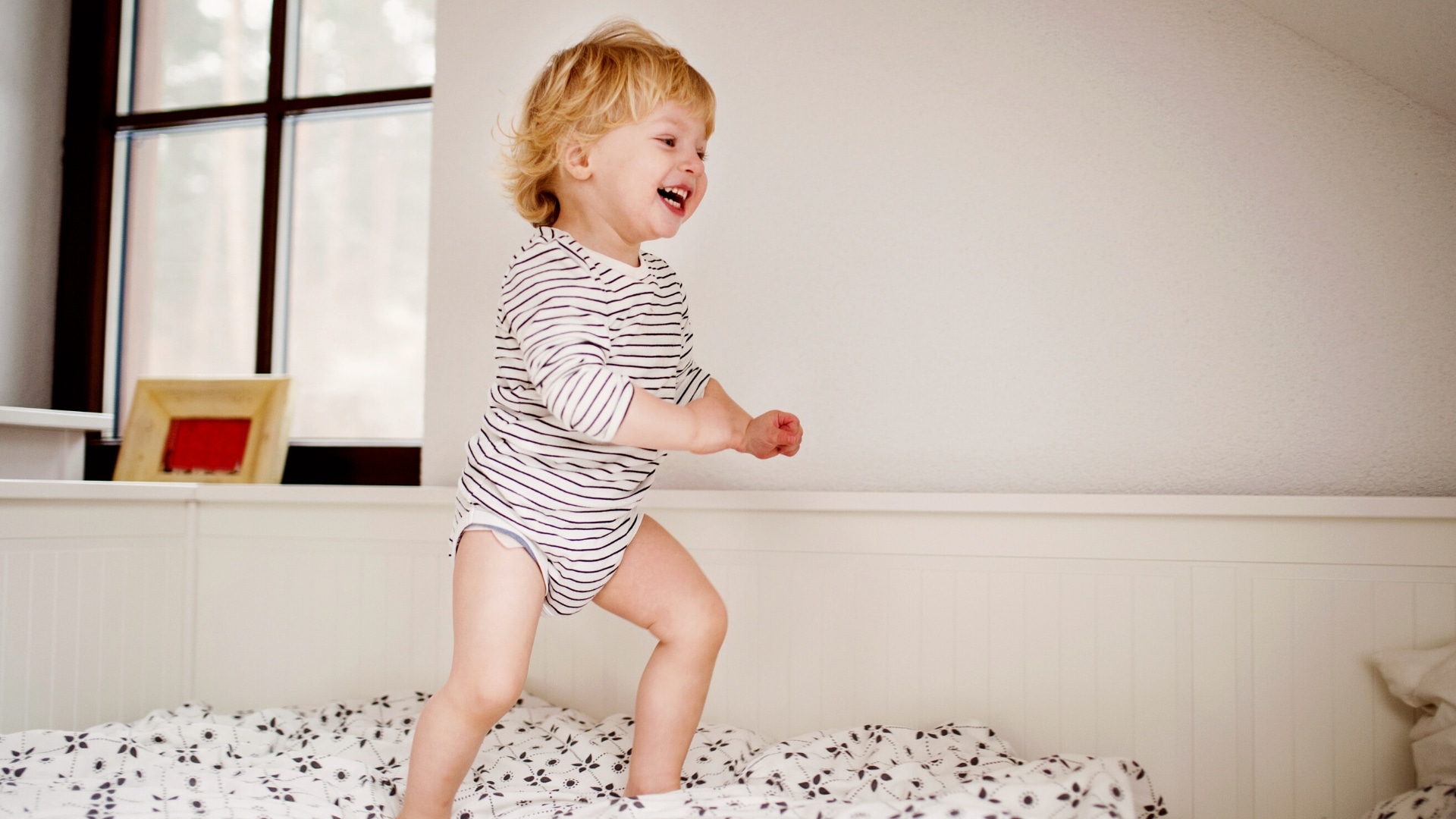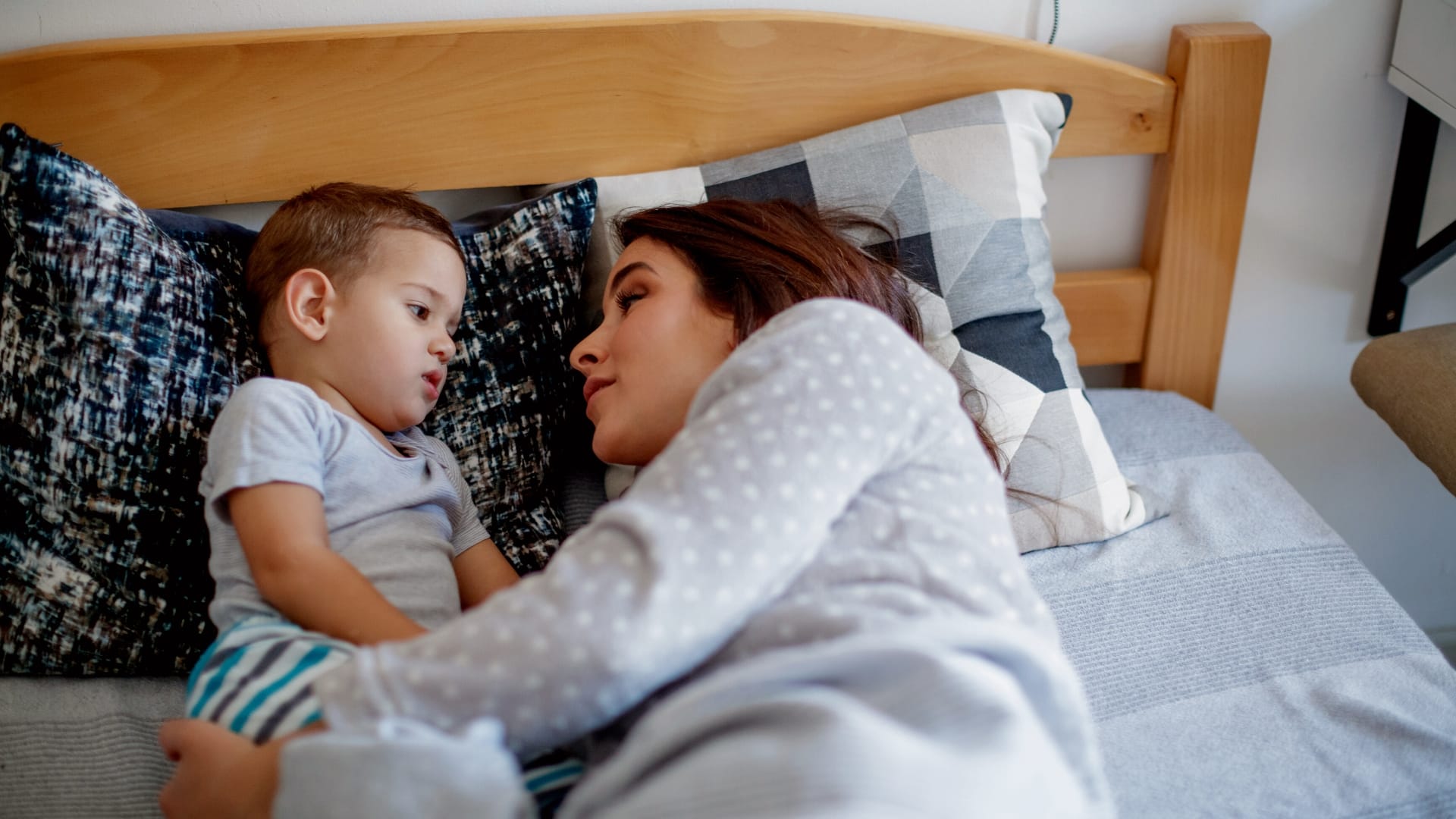Knowing how to get a sick baby to sleep can make all the difference between a quick recovery and the dreaded drawn-out sleepless nights, overtiredness, and never-ending illness…
And I suspect that if you’re reading this then you have a poorly baby for whom you’re trying everything to help feel better and recover quickly.
I feel you. It’s hard work (both emotionally and physically) when you have a sick baby, but with over 40 years as a Norland Nanny, mother, and childcare expert, I am here to help.
I have helped many sick babies get the sleep they need to recover quickly over those 40 years and I want to share my biggest tips for success with you today. So without further ado, let’s dive right in.
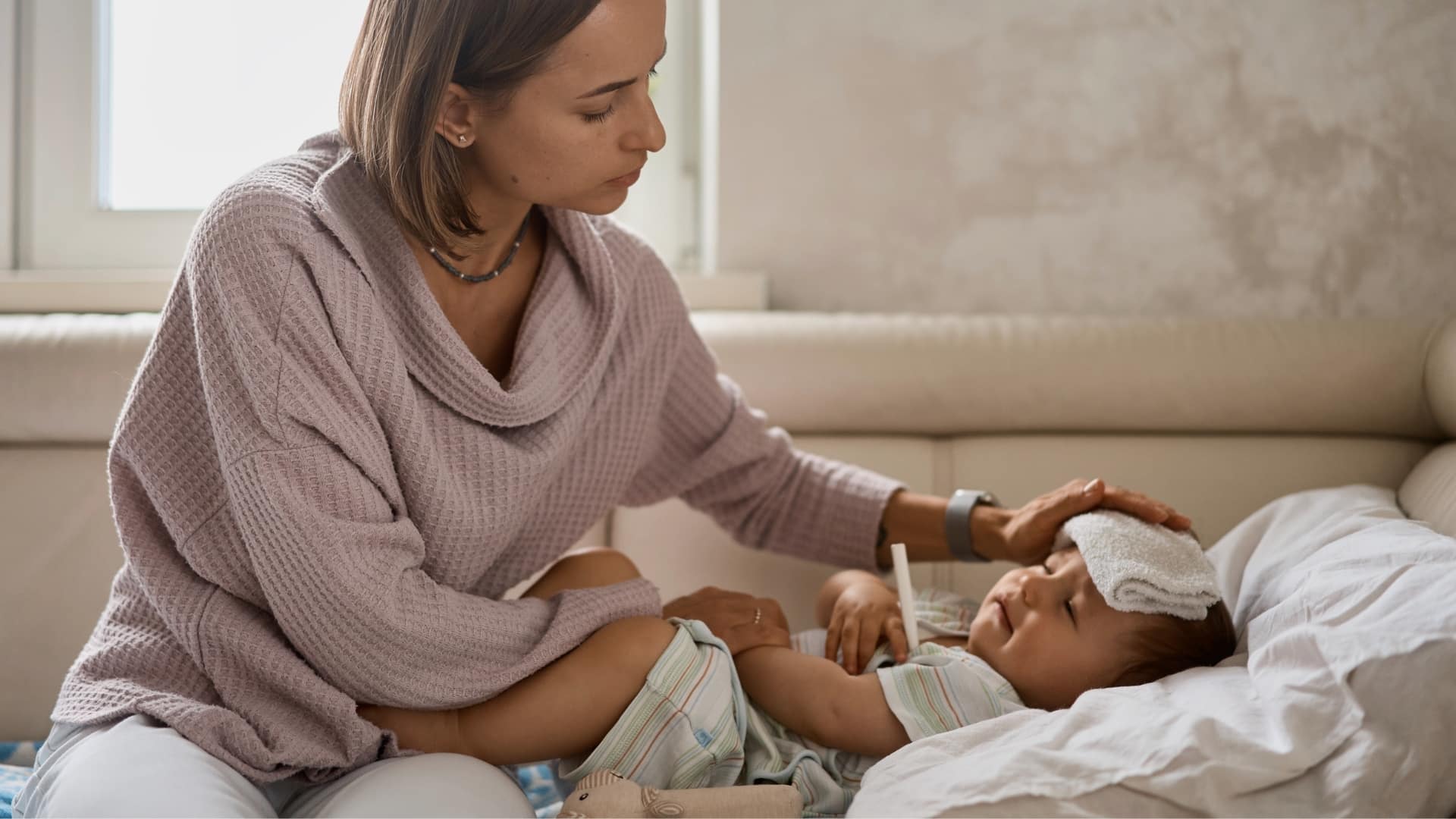
Table of Contents
How To Get A Sick Baby To Sleep
When your baby is sick, the natural instinct for many of us is to offer love, cuddles, warmth, and comfort. And that is exactly what you need to do.
Refined with the following tips, you will be giving your sick baby the best chance of recovering from their bout of illness quickly:

- Offer more sleep: If your sick baby is struggling to sleep, it may be because they’re overtired (more on this in the next section). Most sick babies will naturally need more rest, but if they become overtired, their bodies release even more cortisol and adrenaline keeping them awake. By offering more sleep opportunities and being flexible with sleep schedules during the day can make all the difference. Maintaining a soothing bedtime routine will also help your little one sleep better as these evening cues will prepare them to wind down.
- Make comfort a top priority: A calming comfortable sleeping environment is very important when your baby is unwell. The ideal room temperature should be between 68 – 72 ° Fahrenheit or 20 – 22 ° Celsius and you should consider blackout blinds to limit the daylight interfering with baby’s deep sleep. NOTE: If your baby has a fever they may need less clothing. A normal temperature in babies and children is about 97.5°F (36.4°C), but this can vary slightly. A high temperature or fever is usually considered to be a temperature of 100°F (38°C) or above.
- Keep them hydrated: Remember that a sick baby will need to be kept hydrated and they may be more thirsty than normal, so offering extra feedings (or water if they’re over 6 months old) is essential.
- Baby wear: Babies need extra comfort and holding when they are unwell so to facilitate this and make it easier for you to get things done, try baby wearing and allowing your baby to snuggle and sleep.
- Don’t elevate the crib: While some parents may advise elevating the crib to relieve nasal congestion and help breathing, the AAP does not recommend this practice, and neither do I. Instead, use a humidifier in the bedroom or saline drops to help clear your baby’s nose.
- Be patient: Most importantly be patient. A sick baby may cry more than usual and want to be held, so offer lots of reassurance and cuddles to help them feel secure. Remember that this period of sleep disruption is temporary, and your baby will return to their usual sleep habits once they’re feeling better.
- Consult a doctor: Always trust your instincts and consult a pediatrician if you’re concerned about your baby’s health and sleep habits during a bout of sickness.
TOP TIP: While you should try to avoid creating a habit of feeding to sleep… If this is the only way to soothe your sick baby then go ahead. Now is not the time to sleep train. Now if the time for comfort.
How Do You Get An Overtired, Sick Baby To Sleep?
When illness disrupts your little ones sleep your baby can easily become overtired. This can result in you having to deal with a very cranky little bundle who is really struggling.
During these times, routine becomes even more vital so try to maintain a consistent bedtime routine as much as possible.
- Start the bedtime ritual with a warm bath to help your infant unwind. The soothing effect of warm water, combined with gentle care, can significantly calm your little one but ensure the bath isn’t too long or stimulating, as it’s meant to relax them before sleep.
- Incorporate a gentle infant massage after the bath. This can further soothe your baby, easing the transition into sleep Use calm, gentle motions to reinforce comfort and relaxation.
- In a quiet, dark room, create a sleep-conducive environment by using a white noise machine. This sound can mask household or outside noises that might otherwise disturb your baby’s rest.
- Feeding your baby, not only nourishes but also offers comfort to your sick baby. If your baby has a stuffy nose they may take longer than normal to feed as they will probably need to take more breaks.
- Keep the lights dim and at the correct temperature (68-72 °F or 20-22 °C) to help your baby relax. Offer lots of close cuddles to provide comfort and security too.
NOTE: Offering more daytime opportunities for baby to sleep can help break the overtired cycle and encourage deeper and longer sleep at night.
Why Do Sick Babies Fight Sleep?
When babies are sick, the discomfort they feel makes it hard for them to settle and sleep. Their bodies also release cortisol, the stress hormone, which can impact their ability to settle.
Nasal congestion is a common issue when babies are sick making breathing difficult and causing coughing, further disrupting sleep.
Also, if your baby’s nose is stuffy, they may struggle to breathe easily, especially when lying down.
It helps to remember that your baby is used to feeling a certain way and falling asleep in certain conditions… All of these change when they are unwell, feeling achy, and full of fever. These new routines and feelings can easily result in a sick baby fighting sleep.
It’s also not uncommon for babies to experience a sleep regression during periods of illness… sadly resulting in more night waking or resistance to naps.
Looking to get your little one to sleep quickly and effortlessly? Check out my Bedtime and Nap Cheat Sheet and master the art of making daytime naps and bedtimes as seamless as possible.
A bedtime & nap cheat sheet so good your little one will ask you to put them to bed...
Laura Williams "This is a life saver! I'm so glad I downloaded your bedtime & nap cheat sheet. My little one actually asked me to put him to bed last night! Unbelievable! Thank you so much!"
Click Here For The FREE Cheat Sheet
What Position Should A Sick Baby Sleep In?
While you may be tempted to elevate your baby’s head by raising the mattress of the cot… I do not recommend doing so. The AAP does not recommend raising the mattress either.
Instead, try the following:
- Keep baby upright when awake: For babies with congestion, sleeping slightly upright may reduce discomfort. Try baby-wearing during the day to facilitate this.
- If your child is prone to vomiting, you should still put them on their back to sleep. Read this post to learn more about the risk of babies choking when sleeping on their backs.
- Always lay your baby on their back to sleep. This reduces the risk of SIDS and is the recommended position even when unwell.
Remember, consulting with your pediatrician is the best course of action for advice tailored to your baby’s specific needs.
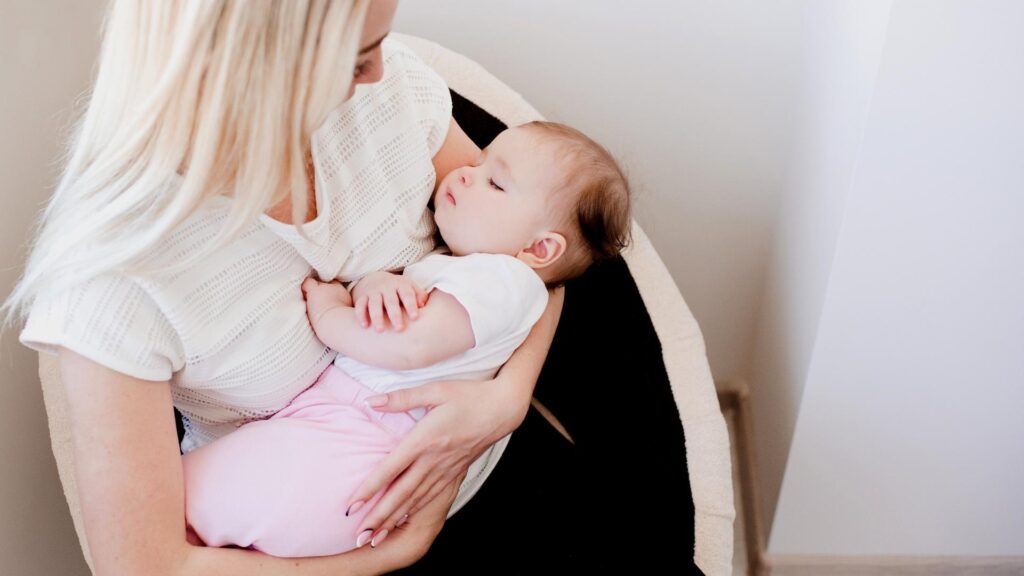
Can You Room Share With A Sick Baby?
Yes, you can room share with a sick baby.
Room sharing with your sick baby can be practical and comforting for both you and your baby and it allows you to monitor their condition closely throughout the night.
By staying in the same room, you can quickly respond to their needs, whether it’s for a cuddle to soothe them back to sleep or for medical attention if their condition worsens.
If you decide to room share, you must be prepared for more frequent night wakings when your baby is sick. Having a plan for these wakings by having water or bottle feeds easy to hand can help you and your baby get as much rest as possible.
NOTE: Do not be tempted to co-sleep with a sick baby. The sleep deprivation you and baby are experiencing will only increase the risks of sharing a bed.
Do Children Sleep More When They Are Sick?
Yes. When your child is sick, their body demands more rest to recover. This means they might sleep more than usual.
The immune system works better with adequate sleep, as it helps fight off illness. An increase in sleep aids in the management of fever, a common symptom in sick children.
If they’re combating a virus, extra sleep can provide the energy needed for healing. However, discomfort can sometimes disrupt their regular naps and nighttime with a stuffy nose or cough making sleeping difficult.
How Much Should A Baby Sleep When They’re Sick?
The simple answer is… as much as they need.
Illness often increases a baby’s need for rest as their body works to recover. This can mean longer naps or more frequent periods of sleep throughout the day.
To best support your baby, pay close attention to their sleep cues and wake windows.
Your baby’s wake windows will probably be shorter during periods of illness to prevent your little one from becoming overstimulated or overtired.
Here’s how much sleep to expect once your baby is feeling better:
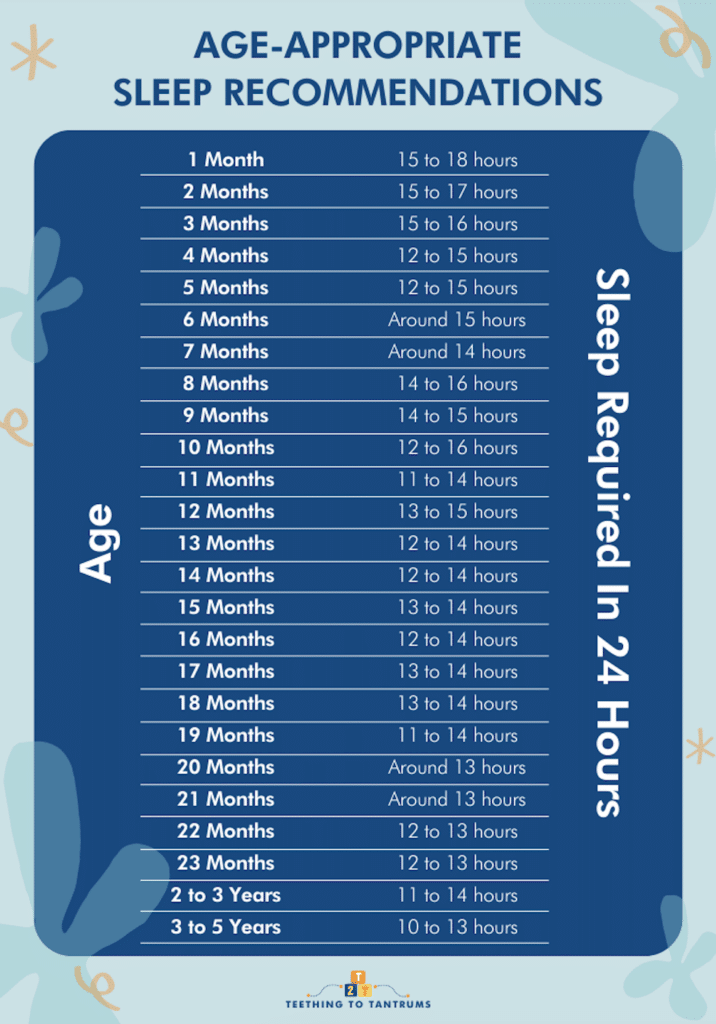
Can You Give A Sick Baby Medication To Help Them Sleep?
When your baby is sick and struggling to sleep, some medication like might be appropriate (such as acetaminophen or ibuprofen to reduce fever and relieve discomfort)… HOWEVER, it is crucial to consult your pediatrician before administering any medicine to your baby.
Not all medications are safe for babies. And the proper dose for baby-safe medications depends on your baby’s weight and age.
Avoid using over-the-counter cold and cough medicines for infants too. The FDA advises against these medicines for young children as they can cause serious side effects. Your pediatrician can recommend safe alternatives.
Natural Remedies To Help Your Baby Sleep
- Nasal rinse solution: Doctors will often recommend saline drops and sprays, as well as sinus rinses as they do not contain any heavy medication and are often a very effective and a great way to relieve congestion in babies.
- Humidifier: Central heating can often make mucus thicker and more difficult to clear. Placing a humidifier in your baby’s sleep space can help keep enough moisture in the air to make the mucus run more freely and help your baby breathe more easily.
- Steam: A steamy bathroom created from a shower or bath can also help free up congesting mucus before bedtime making it easier for your baby to settle.
Can You Sleep Train When Baby Is Sick?
When your baby is sick, sleep training can be challenging. I would not recommend sleep training when baby is sick as their comfort and health should always come first.
It’s important to provide reassurance and respond to their needs during this time instead.
However, this does not mean abandoning all of your established sleep routines.
- Maintain a consistent sleep environment to encourage familiarity and security.
- Focus on the sleep skills your baby has already developed. If sleep training has already begun, continue with established practices as much as possible but be aware that you may need to offer additional comfort.
- If illness interrupts your sleep training progress, don’t worry. A baby’s immunity and ability to self-soothe will usually bounce back once the worst of the illness has passed.
- Offer extra cuddles and reassurance, but try to avoid creating new habits that might hinder previous training (like feeding or rocking to sleep).
- Keep your baby’s routine as close to normal as possible given the circumstances.
Remember, you can always reinforce sleep training and get things back on track once your baby is feeling better.
Frequently Asked Questions About Getting Sick Babies To Sleep
This section provides specific advice for common concerns about caring for a sick baby’s sleep needs.
Q: What are the best techniques to help a sick baby fall asleep?
A: To help your sick baby sleep, create a comfortable environment. Adjust the room temperature and dim the lights to promote relaxation. Offer lots of cuddles and love too.
Q: How can I comfort my sick baby who only sleeps when held?
A: If your sick baby won’t sleep unless held, hold your baby close to provide comfort and warmth, as this can be very reassuring. Once your baby is asleep, try transferring them gently to a safe sleeping space like a crib or bassinet that has been pre-warmed. A sick baby will not like moving from your warm body to cold sheets. Consider baby-wearing during the day and share the load with a partner or other trusted family member.
Q: What strategies can I use when my sick baby wakes frequently during the night?
A: If your baby wakes up often when sick, try to respond quickly to their needs. You can soothe them with a gentle pat or shushing sound. Ensure any feeding or diaper changes are done with minimal disturbance to encourage a swift return to sleep.
Q: Is it necessary to wake a sick baby for feeding, and how often should this be done?
A: In general, it’s not necessary to wake a sleeping, sick baby for feeding unless advised by your pediatrician. However, if baby is under 6 months or has specific health concerns, consult your healthcare provider for personalized guidance on feedings.
Need More Parenting Help?
- Download our FREE Perfect Sleep Cheat Sheet. It’s a free, easy-to-use and proven formula designed for parents of 0-5 year olds to master the art of consistently undisturbed and restful sleep without the yelling, nagging or exhausting long-winded evenings.
- Check out our Parenting Toolbox. You’ll get access to expertly-chosen products that you can guarantee are the best for your little one and your wallet.
- Ready to create the calm, peaceful evenings you deserve? Then checkout our most popular course - The Bedtime Battles Masterclass

A bedtime & nap cheat sheet so good your little one will ask you to put them to bed...
Laura Williams "This is a life saver! I'm so glad I downloaded your bedtime & nap cheat sheet. My little one actually asked me to put him to bed last night! Unbelievable! Thank you so much!"
Click Here For The FREE Cheat Sheet
